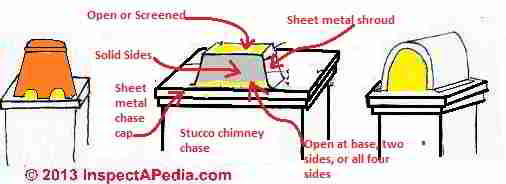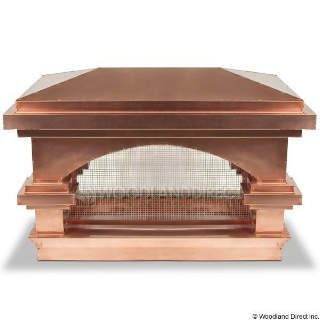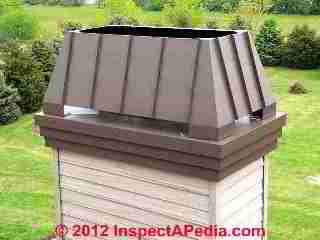 Chimney Top Shrouds, Caps, Covers
Chimney Top Shrouds, Caps, Covers
Installation, inspection, listing & code compliance & fire hazards of decorative chimney top shrouds & covers
- POST a QUESTION or COMMENT about Decorative Chimney Caps, Tops, Shrouds: installation, listing, building code approvals, inspection, fire safety hazards
Guide to decorative chimney top shrouds, caps, covers: this article describes the code, listing, and safety requirements ofr decorative chimney top shrouds or covers installed on or over factory-built chimneys and atop wood-framed or similar chimney chases.
Typically a metal or factory-built chimney is constructed to vent a factory-built fireplace or other heating appliance.
A history of building fires traced to improper construction and installation of non-listed decorative chimney top shrouds has led to expert recommendations to improve building safety and reduce fire risks.
InspectAPedia tolerates no conflicts of interest. We have no relationship with advertisers, products, or services discussed at this website.
- Daniel Friedman, Publisher/Editor/Author - See WHO ARE WE?
How to Install & Inspect a Decorative Chimney Top Shroud
Baird (1991) reported on a number of chimney & house fires occurring in California (CHIMNEY SHROUD FIRE) from 1989 through the early 1990's and explained that all of the fires investigated occurred in chimney chases that had been equipped with decorative sheet metal "shrouds".
[Click to enlarge any image]
The chimney shroud was a cosmetic cover that some builders or homeowners installed for aesthetic reasons - not wanting to see the simple factory chimney and chimney cap such as those shown in our two photographs just below. [4]
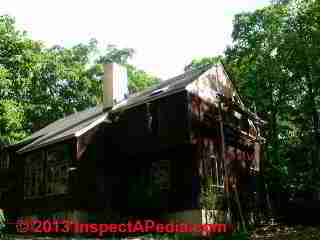 Baird reported on the reasons that un-listed chimney top shrouds were the cause of serious building fires and recommended a variety of steps to reduce the risk of future fires including using only listed chimney top shrouds and the inspection of both existing and new factory-built fireplace and chimney installations.
Baird reported on the reasons that un-listed chimney top shrouds were the cause of serious building fires and recommended a variety of steps to reduce the risk of future fires including using only listed chimney top shrouds and the inspection of both existing and new factory-built fireplace and chimney installations.
At above left our sketch, adapted from a drawing provided by a Vista CA fire department, shows examples of decorative chimney caps or shrouds that may not be listed and are likely to be unsafe, risking serious building fires.
But as you will see in illustrations provided below, there are now tested, listed versions of some of these decorative chimney shrouds - making inspection and a check for listing labels very important.
At left our photo illustrates a New York home and its chimney chase being reconstructed following a disastrous chimney chase fire.
Baird concluded that "Failure to fabricate a chase flashing according to the manufacturer's instructions constitutes a violation of the Uniform Mechanical Code" and concluded that "... future installations must not include unlisted attachments to a listed [fireplace or chimney] assembly."[4]
Below, Steve Werner, representing a current manufacturer of tested and listed decorative chimney top shrouds provided updates for this topic in 2012 & 2013
Where & Why House Fires Occur in Factory-Built Fireplace & Chimney Installations
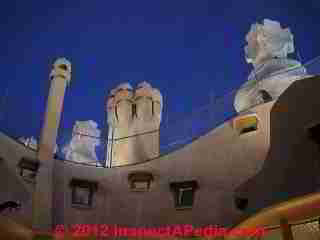 Two common ingredients in factory-built fireplace and chimney and chimney chase fires reported by all of our sources are the combination of a metal or factory-built fireplace or fire-box and chimney combined with a decorative chimney top cap or shroud that was installed over the manufacturer's spark arrestor and cap assembly.
Two common ingredients in factory-built fireplace and chimney and chimney chase fires reported by all of our sources are the combination of a metal or factory-built fireplace or fire-box and chimney combined with a decorative chimney top cap or shroud that was installed over the manufacturer's spark arrestor and cap assembly.
- See CHIMNEY SHROUD FIRE for a field report of a severe chimney, chimney chase & house fire (Moorpark CA) attributed to an un-listed chimney top shroud.
- See FIREPLACE INSPECTION PRE-FAB for a detailed inspection checklist.
Our photo (left) illustrates masonry chimney top shrouds atop the Gaudi apartment building in Barcelona, Spain. No fires have been reported associated with these chimney tops.
Watch out: according to both Steve Werner [5][6] and to Dale Feb [3], some fireplace top shrouds or surrounds installed on some chimney chase tops may unsafe due to heat trapping at the chimney top. Feb points out that use of such shrouds may violate local and national building codes as well.
Definition, Features, & Hazards of Decorative Chimney Crowns, Shrouds, Caps, Tops
Steve Werner, Chimney King LLC. [35][5]
A "Chimney Crown" as popularly used in the fireplace industry may refer to a decorative top shroud installed atop a wood-framed chimney chase, as illustrated here.
Steve Werner, a home inspector and chimney shroud installer with Chimney King [6], a custom chimney "crown" designer in Gurnee IL, provided us with the following wood framed chimney chase top pans along with comments.
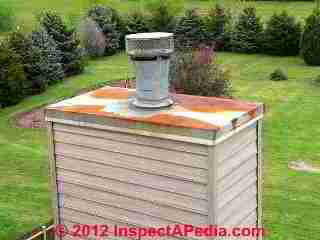 ...
... 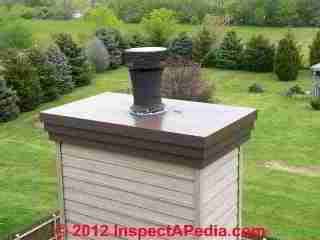
In the photo at above left, the top of the chimney chase was too small to allow for a decorative shroud to function safely according to our UL/OMNI test labs certification. We designed what we call a ‘super chase pan’ to increase the size of the top of the chase so a legal labeled shroud could be placed on top.
At above right we can see the newly fabricated chimney chase top pan that has been corbelled out to increase its footprint or horizontal size dimensions to accommodate a decorative top shroud.
At below left is a listed chimney shroud that was installed on the same chimney top.
At below right, in comparison, is a home-made chimney shroud we observed in Dutchess County New York. I'm not sure that this chimney top treatment is listed nor fire-safe.
 ...
... 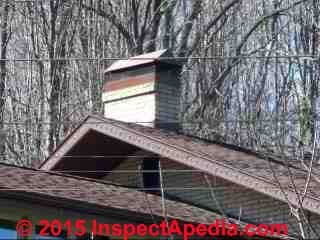 .6
.6
Mr. Werner continues:
In the fireplace industry we use the term “chase pans” for the covering at the top of a wood framed chimney chase.
There is a science behind the type of fireplace/stove, pipe manufacturer’s and size of the chimney/chase that makes these decorative shrouds safe for the people living the home.
Our company, ChimneyKing, has bought lots of fireplaces, pipe, and made many decorative shrouds for testing in these labs to assure that our products are labeled and safe.
Unfortunately, there are many decorative chimney top shrouds out there that are not listed and labeled. That’s where the possible fire problem comes in. I have read articles from southern California and the Phoenix about fires related to non listed shrouds.
Model Building Code Citations Regulating Decorative Chimney Top Shrouds
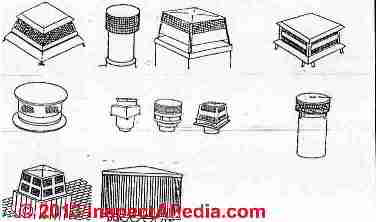 at left our sketch, adapted from a drawing provided by a Vista CA fire department, shows examples of decorative chimney caps or shrouds that may be listed and approved. But you will still want to check for listing and labels as there are "lookalike" versions that are unsafe.
at left our sketch, adapted from a drawing provided by a Vista CA fire department, shows examples of decorative chimney caps or shrouds that may be listed and approved. But you will still want to check for listing and labels as there are "lookalike" versions that are unsafe.
[Click to enlarge any image]
Mr. Werner and ChimneyKing provided the following citations [35]
- International Mechanical Code IMC (2000), M74-98 806.6, ratified 9.98, model building code for the United States,
806.6 Decorative Shrouds.
Decorative [chimney top] shrouds shall not be installed at the termination of factory-built chimneys, except where such shrouds are listed and labeled for use with the specific factory-built chimney system and are installed in accordance with section 304.1. Reason: Decorative shrouds have been the cause of roof and chase fires - International Residential Code (IRC) (2010) R1004.3 Decorative shrouds.
Decorative [chimney top] shrouds shall not be installed at the termination of chimneys for factory-built fireplaces except where the shrouds are listed and labeled for use with the specific factory-built fireplace system and installed in accordance with the manufacturer’s installation instructions. Thanks to Home Inspector Mark Cramer for this update - Ed. - International Residential Code (IRC) (2000), R1002.2 ratified 9/99, 1000.2 Decorative Shrouds.
Decorative [chimney top] shrouds shall not be installed at the termination of factory-built chimneys, except where such shrouds are listed and labeled for use with the specific factory-built chimney system and are installed in accordance with the manufacturers installation instructions. Reason: Decorative shrouds often allow for the creation of temperatures in excess of those permitted in UL 103 and UL 127. Decorative shrouds have been the cause of chase top fires ..
- International Fire Code (IFC) (2000), IFC 603.6.3, 603.6.3 Decorative Shrouds.
Decorative [chimney top] shrouds installed at the termination of factory-built chimneys shall be removed, except where such shrouds are listed and labeled for use with the specific factory-built chimney system and are installed in accordance with the manufacturers installation instructions. Reason: Decorative shrouds have been the cause of dozens of chase fires. As a non-listed part to a listed assembly, their use should not have been allowed in the first place.
Examples of Product Listing Labels for Decorative Chimney Shrouds, Caps, Covers
Below are examples of tested, listed decorative chimney caps or crowns provided courtesy of Chimney King. InspectAPedia is an independent publisher of building, environmental, and forensic inspection, diagnosis, and repair information provided free to the public - we have no business nor financial connection with any manufacturer or service provider discussed at our website.
The Municipal Building Inspectors have gotten very wise these days: Regarding shrouds used with factory built chimney,
- UL 441 ‘gas’, UL 127 air cooled ‘wood,’ UL 103 solid wall insulated ‘solid fuel’ chimney systems, in order to do their job properly, they are demanding the shroud and label contain:
- 1. listing agency
- 2. listing #
- 3. label with sequential number with listing lab logo and shroud manufacturer ID
- 4. specific fireplace model and number in the installation instructions
- 5. specific pipe brand and model #/ size of pipe in the installation instructions.
- 6. specific shroud model and specs to be described in the installation instructions with listing #, listing lab logo and shroud manufacturer location (which is why our instructions for MHSC Direct Vent chimney are 17 pages long)
- 7. specific shroud manufacturer and location of manufacturing.
This is how they want the Label and the Installation instructions to read, in order to meet current codes.
According to UL, OMNI and Intertek, who we have current listings for shrouds with as of February 22, 2013, this is correct protocol.
Regarding the label and its sequential #, the shroud manufacturer must keep a log of all labels used and the specific customer for each, so the listing agency compliance inspector, who visits randomly every 3 to 6 months, can verify that every label can be traced back to the specific customer and invoice.
Below we include an example of a UL-listed label for a decorative chimney shroud produced by Chimney King. Notice that in addition to the UL listing information the label includes a part serial number.
Below is a second example product label provided by Chimney King.
At the request of UL we have overlaid all of these listing labels with a red imprint to make clear that copying of these or any other illustrations at InspectApedia is a violation of federal copyright law as well as other rights and statutes enforced by the listing agency, in this case Underwriters Laboratories.
As to Gas Direct Vent appliances, the UL and ANSI standards require any accessory (like a shroud) that is to be used with a direct vent appliance to be tested and listed with the unit. That is why we are testing our shrouds with each DV manufacturer. A generic leg, that allows anyone to make a shroud to go on top from a non inspected facility, is not allowed in theory.
- CHIMNEY KING INSTALLATION INSTRUCTIONS FOR CHIMNEY CROWN, [PDF]
- Chimney fire report & chimney fire safety advice: Vista Fire Department, [PDF]
Home Inspection Report Language for Chimney Shrouds
Steve Werner, Chimney King LLC. [35][5]
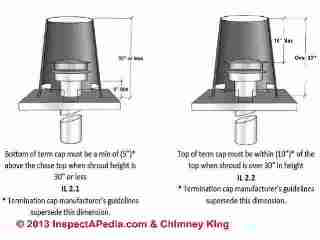 We have recently completed more testing at OMNI and Underwriters Labs to expand our number of listings to ensure these [chimney top] shrouds are listed, labeled and safe.
We have recently completed more testing at OMNI and Underwriters Labs to expand our number of listings to ensure these [chimney top] shrouds are listed, labeled and safe.
Below is the inspection process, attached are a set of Installation instructions that are shipped with every decorative shroud, ( FYI) scanned labels that should be on these shrouds and a letter from the Vista Fire Department in California.
[Click to enlarge any image]
Our sketch (courtesy of Chimney King) at left illustrates a difficulty of inspecting the safety of a decorative chimney top shroud even if on-roof access is possible. Details such as the minimum clearance between the top of the chimney chase pan flashing and the bottom of the terminating chimney cap may be difficult to inspect except during installation of these components.
I know as a Licensed Home Inspector in Wisconsin we are not required to inspect the top of a chimney or chase that is not ‘readily accessible.’ When I observe one of these ‘decorative shrouds’ on an Inspection the disclaimer used in my report says:
The home has manufactured metal fireplace(s). We observed a ‘decorative shroud’ (see photo) attached to the top of the chimney/chase on the home.
There have been many chimney fire related problems documented from these shrouds that were not tested and listed with Underwriter’s, OMNI or Intertek Labs and International Mechanical, Residential and Fire Codes written calling for their removal.
Recommend consulting with the current homeowner and/or local building department to ensure that the existing ‘decorative shroud’ is in fact listed, labeled and safe.
Hopefully this will keep me from getting sued if by some chance there is an actual chimney fire.
[Click to enlarge any image]
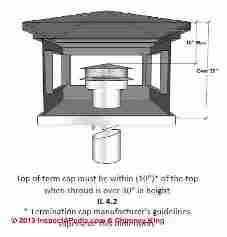
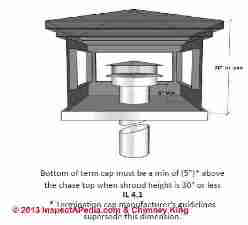
Watch out: Our sketch (courtesy of Chimney King) above illustrates additional fire clearance requirements between the chimney terminating top cap or spark arrester and an open decorative top chimney shroud.
Only by consulting the manufacturer's installation instructions can an inspector be sure that all of the required clearances and distances have been respected.
- Stephen Werner General Manager Chimney King, LLC P.O. Box 8 Gurnee, IL 60031 Corporate (847) 244-8860 Fax (847) 244-8694 Email: steve@chimneyking.com
...
Reader Comments, Questions & Answers About The Article Above
Below you will find questions and answers previously posted on this page at its page bottom reader comment box.
Reader Q&A - also see RECOMMENDED ARTICLES & FAQs
On 2020-10-22 by (mod) - chimney shrouds or covers for multiple flues: use listed/approved devices
Thank you for the helpful question about getting your local building inspector to approve a chimney cover or shroud that you want to have installed.
The inspector is, as you'll read, concerned for safety, but nevertheless you may be able to resolve the question, as I'll explain. And you'll read in IFC 606.6.3 that a decorative shroud that is NOT listed and labeled as proper for your use must be removed.
It is common to install a common cover or chimney shroud over two flues, and they can work provided the flues are spaced properly, end at different heights, and provided that the cap or shroud is sufficiently high above the highest of the two flues that it does not interfere with its draft.
You might point out in the manufacturer's literature that there are chimney shrouds that are UL- listed as safe and approved including for use over multiple flues.
But your local code inspector is the final legal authority. You might try presenting her with your code-approved listing information and specifications from the manufacturer of the cap that you like. Call the manufacturer and get documentation showing that the shroud you want is in fact listed.
For example, woodlanddirect.com lists chimney shrouds that are, according to Woodland, UL Classified, MH30042
as does Chimney King who contributed much of the content of the article above on this page.
Watch out: as we warn in this article series, not all chimney caps and covers or "decorative shrouds" are considered safe nor UL-listed.
In the U.S. chimney caps should be UL listed and should therefore comply with the International Fire Code section 603.6.3 (given just below) or locally-adopted chimney codes.
International Fire Code 603.6.3 Decorative Shrouds
603.6.3 Decorative shrouds.
Decorative shrouds installed at the termination of factory-built chimneys shall be removed except where such shrouds are listed and labeled for use with the specific factory-built chimney system and are installed in accordance with the chimney manufacturer’s instructions.
You can find all of the pertinent chimney codes in PDF and download formats at
On 2020-10-22 by Lora York
I am in process of converting one of two flues in the chimney of our 1926 masonry chimney. One flue (with cracked liner) is for the fireplace on the top floor. The uncracked flue is for the wood-burning heater downstairs. I will line the flue for the heater with UL 1777-rated flexible liner and cut down the second flue and extend it to 24".
On top I had not wanted two separate galvanized "squirrel cages" (bc they are ugly!). Inspector says that copper shroud that would cover entire chimney, both flues, will interfere with flow of two flues, each at different height. Is that absolutely true? Is it worse than the interference of each squirrel cage cap?
I am considering clay caps, but they have no wire caging and no "roof" to prevent water.
What is your opinion about my options. I live on an island off the coast of Southern California.
Rain only problem. And some wind since the house is on a hill. [I think I attached two pics.]
...
Continue reading at CHIMNEY SHROUD FIRE, or select a topic from the closely-related articles below, or see the complete ARTICLE INDEX.
Or see these
Recommended Articles
- CHIMNEY CAP / CROWN CONSTRUCTION
- CHIMNEY CAP & CROWN DEFINITIONS
- CHIMNEY "CAP" CROWN / TOP SEAL INSPECTION
- CHIMNEY CHASE FIRE
- CHIMNEY CODES
- CHIMNEY INSPECTION DIAGNOSIS REPAIR - home
- CHIMNEY RAIN CAP / RAIN COVER INSPECTION
- CHIMNEY RAIN CAP / RAIN COVER DIY
- CHIMNEY RAIN CAP VENT OPENING SIZE
- CHIMNEY POTS & DECORATIVE TOPS
- CHIMNEY SHROUDS
- CHIMNEY SHROUD FIRE
- CHIMNEY TOP MASONRY DAMAGE
Suggested citation for this web page
CHIMNEY SHROUDS at InspectApedia.com - online encyclopedia of building & environmental inspection, testing, diagnosis, repair, & problem prevention advice.
Or see this
INDEX to RELATED ARTICLES: ARTICLE INDEX to CHIMNEYS & FLUES
Or use the SEARCH BOX found below to Ask a Question or Search InspectApedia
Ask a Question or Search InspectApedia
Try the search box just below, or if you prefer, post a question or comment in the Comments box below and we will respond promptly.
Search the InspectApedia website
Note: appearance of your Comment below may be delayed: if your comment contains an image, photograph, web link, or text that looks to the software as if it might be a web link, your posting will appear after it has been approved by a moderator. Apologies for the delay.
Only one image can be added per comment but you can post as many comments, and therefore images, as you like.
You will not receive a notification when a response to your question has been posted.
Please bookmark this page to make it easy for you to check back for our response.
IF above you see "Comment Form is loading comments..." then COMMENT BOX - countable.ca / bawkbox.com IS NOT WORKING.
In any case you are welcome to send an email directly to us at InspectApedia.com at editor@inspectApedia.com
We'll reply to you directly. Please help us help you by noting, in your email, the URL of the InspectApedia page where you wanted to comment.
Citations & References
In addition to any citations in the article above, a full list is available on request.
- In addition to citations & references found in this article, see the research citations given at the end of the related articles found at our suggested
CONTINUE READING or RECOMMENDED ARTICLES.
- Carson, Dunlop & Associates Ltd., 120 Carlton Street Suite 407, Toronto ON M5A 4K2. Tel: (416) 964-9415 1-800-268-7070 Email: info@carsondunlop.com. Alan Carson is a past president of ASHI, the American Society of Home Inspectors.
Thanks to Alan Carson and Bob Dunlop, for permission for InspectAPedia to use text excerpts from The HOME REFERENCE BOOK - the Encyclopedia of Homes and to use illustrations from The ILLUSTRATED HOME .
Carson Dunlop Associates provides extensive home inspection education and report writing material. In gratitude we provide links to tsome Carson Dunlop Associates products and services.


